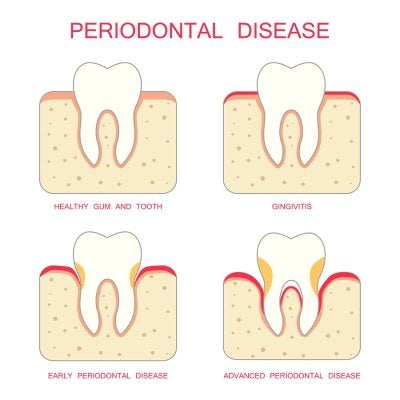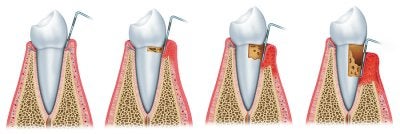-
Why It’s Important to Treat Gum Disease
Gum disease, or periodontal disease, is caused by poor dental hygiene. When plaque builds up on your teeth and hardens into tartar, it harbors harmful, dangerous bacteria. If not treated by a dentist or periodontist, this bacteria eventually causes gum disease. If you’re concerned that you might be suffering from gum disease in Bel Air , visit a dentist near you for treatment as soon as possible. Keep reading for information about why it’s important to treat gum disease.
Avoid Receding Gums
 If left untreated, the early, milder symptoms of gum disease will quickly progress into much more serious dental problems. Gum disease causes your gums to become inflamed, tender, and red. They will bleed easily, making you very susceptible to oral infections. Your gums will also begin to recede. If you visit a dentist regularly, or visit a periodontist at the first sign of gum disease, you can avoid developing receding gums.
If left untreated, the early, milder symptoms of gum disease will quickly progress into much more serious dental problems. Gum disease causes your gums to become inflamed, tender, and red. They will bleed easily, making you very susceptible to oral infections. Your gums will also begin to recede. If you visit a dentist regularly, or visit a periodontist at the first sign of gum disease, you can avoid developing receding gums. Prevent Tooth Loss
As gum disease continues to infect your gums and tissues, the gums will begin to pull away from the teeth. This causes spaces, or pockets, to form between the teeth and gums. These pockets are very vulnerable to infection, as it’s easy for bacteria and food to get trapped inside them. While the body’s immune system fights the bacterial infection, the bone and connective tissue that hold the teeth in place will begin to break down. If an emergency dentist or periodontist doesn’t intervene, you may eventually suffer from tooth loss.Decrease Your Risk of Developing Other Health Problems
The longer gum disease is left untreated, the more severe it becomes. Because it’s a very serious infection, it can spread to other parts of your body through your bloodstream. Your immune system will continue trying to fight the infection, which will tax your body’s resources, making you feel weak. If a dentist doesn’t treat gum disease, the infection can increase your risk of developing very serious health problems. Due to your weakened immune system, you will be much more susceptible to cardiovascular disease, diabetes, respiratory disease, and certain types of cancer. -
The Truth Behind Gum Disease Myths
In order to keep yourself in proper oral health, it is helpful to differentiate myth from truth. Unfortunately, there are many myths about gum disease that your dentist in Bel Air will confirm are false. Getting the facts about gum disease will allow you to react to the warning signs and prevent this condition from developing further. Read on for a look at the truth behind gum disease myths.
Myth: Proper Oral Hygiene Will Always Prevent Gum Disease
Practicing proper oral hygiene by brushing and flossing your teeth every day is a great way to keep your teeth and
gums in good shape. However, oral hygiene is not the only factor that determines your risk for gum disease. Even if you are completely dedicated to oral hygiene, there are other elements that may still put you at risk for this condition. Tobaccouse is one factor that may counteract your daily brushing and flossing. Your genetics, nutrition, and the level of stress that you endure on a daily basis may also impact your vulnerability to gum disease . While proper oral hygiene can certainly help, it is important to assess these other factors.
Myth: You Cannot Replace a Tooth Lost from Gum Disease
Advanced gum disease can lead to tooth decay and tooth loss, but this is by no means an indicator that you cannot have the tooth replaced. If you suffer from gum disease, you should be communicating with your dentist more frequently in order to treat the problem. In some cases, part of this treatment includes restorations like dental implants. A dental implant will replace your tooth and serve you with a number of benefits including retained bone mass and straight teeth.Myth: Gum Disease Cannot Affect Your General Health
Your oral health and general well being are linked in ways that many people are not aware of. It is important to realize that gum disease can impact your general health by further progressing other conditions like diabetes and heart disease. If you think you might be suffering from gum disease, it is wise to talk to your dentist immediately. -
Spotting the Signs of Gingivitis
Failing to take care of your teeth properly and see your dentist in Bel Air on a regular basis can result in problems such as gingivitis. If left untreated, this condition may progress into periodontal disease and can result in tooth loss. It is helpful to familiarize yourself with the various signs and risk factors associated with gingivitis. Continue on if you could use some help spotting the signs of gingivitis.
The symptoms of gum disease are not always obvious, which makes the condition difficult to detect in some cases. One of the most prevalent red flags is the presence of blood when you brush your teeth. If you notice that your gums are bleeding, it is wise to schedule an appointment with your dentist in the near future. Your gums may also be swollen and tender to the touch. Another sign of gingivitis is shifting of your teeth or change in your bite. If you feel like your teeth do not fit together the way they usually do, visit your dentist to find out if you have gingivitis. Individuals who use tobacco products, practice poor dental hygiene, or have certain illnesses should be particularly wary regarding these signs.

-
How to Floss Properly
Prevent gum disease in Bel Air by learning how to care for your teeth and gums! Brushing your teeth is essential for removing food and drink residue that can lead to plaque and tartar—but it cannot reach every surface in your mouth! That is why it is also important to floss once a day. Flossing removes the food debris that get stuck between your teeth, resulting in a cleaner mouth and healthier teeth and gums.
Start by finding the right floss for your teeth. You should use approximately 18 inches to make sure you can clean between all of your teeth. Wrap each end of the floss around your middle fingers and carefully place the floss between two teeth. Create a U-shape around each tooth and move the floss up and down for proper cleaning. If you have a hard time using regular floss, ask your family dentist to recommend floss sticks or other products.
-
Meet Dr. Danielle Zhu
Home dental care is not enough to keep teeth and gums healthy—you also need to find a great dentist in Bel Air ! A great dentist will help you feel comfortable and make sure you understand concerns and treatment options that can improve your smile.
When you visit Your Smile, you can feel comfortable meeting with Dr. Danielle Zhu. Dr. Zhu specializes in a variety of dental fields, providing treatments for patients of all ages and with an assortment of concerns and dental emergencies. Before becoming a well-known dentist in Bel Air, Dr. Zhu earned her undergraduate degree from UMBC and went on to receive a dental degree from the University of Maryland Dental School. Dr. Zhu also has a prosthodontic clerkship and post doctorate training in advanced general dentistry on her résumé! Along with these accomplishments, patients can also feel comfortable knowing that Dr. Zhu is a member of the American Dental Association, the Academy of General Dentistry, and the Maryland State Dental Association.

-
The Stages of Gum Disease
Gum disease is a serious oral health issue that causes pockets in the gums, destruction of the bone, and might even lead to the loss of one or more teeth. The best way to prevent gum disease in Bel Air is to understand its different stages and what to do to prevent them. Keep reading to learn more about the progression of periodontal disease:
Gingivitis
Gingivitis is the initial stage of gum disease. When there is a lot of plaque and bacteria in the mouth, it might lead to inflammation and infection in the gums. Gingivitis usually causes the gums to bleed, swell, or to become tender. If you notice that your gums look different or start to bleed when you brush your teeth, you should schedule an appointment with your dentist. With a deeper cleaning and a periodontal treatment, gingivitis is completely reversible. You should also make an effort to improve your home hygiene routine and limit your sugar intake.
Periodontitis
If you do not get treatment for your gingivitis, it might turn into periodontitis, which is a more serious stage of gum disease. As the infection and inflammation in the gums progresses, it will start to destroy the bone and fibers in the jaw. This could cause large pockets between the teeth and the gums where even more plaque and bacteria can develop and make the problem even worse. Visiting the dentist for periodontal treatment can help you prevent the disease from getting any worse . It is also important to brush the teeth twice a day and floss once a day to keep the gums as healthy as possible.Advanced Periodontitis
This stage of gum disease is the most serious. Without the fibers and bones to support the teeth, advanced periodontitis might cause the teeth to loosen or shift in the mouth. Once the teeth move out of their original position, it might become difficult to bite and to chew. Without help from your dentist, advanced periodontitis could cause you to lose one or more of your teeth.
RECENT POSTS
categories
- Uncategorized
- General Dentistry
- Toothache
- Emergency Dentistry
- Family Dentistry
- Receding Gums
- Cosmetic Dentistry
- Veneers
- Gum Disease
- Gingivitis
- Dental Crowns
- Orthodontics
- Dental Implants
- Root Canal
- Wisdom Teeth
- Teeth Whitening
- Your Smile
- Composite Fillings
- Lumineers
- Dentures
- Invisalign
- BrightSmile
- Dental Bridge
- Abscessed Tooth
- Sealants
